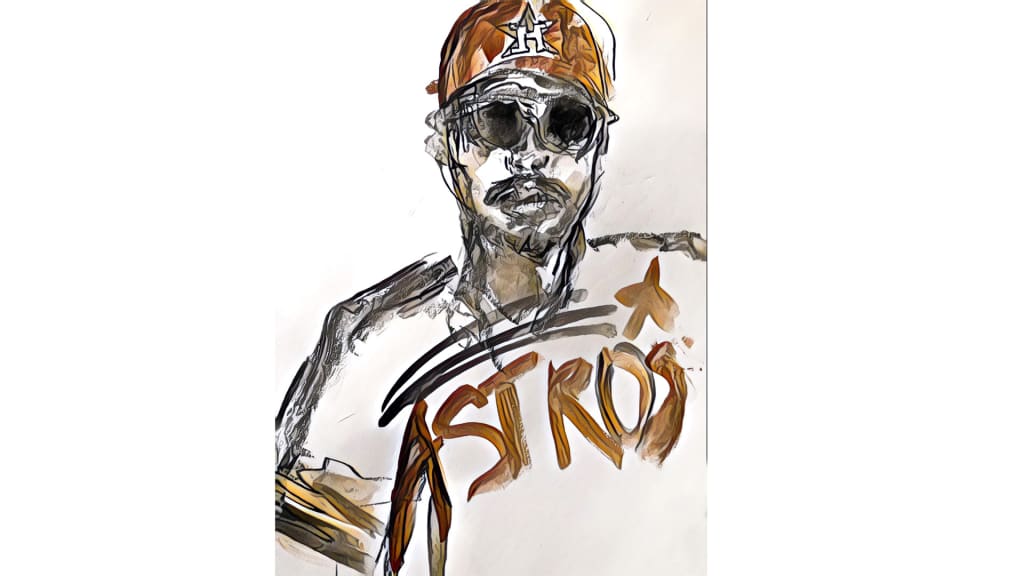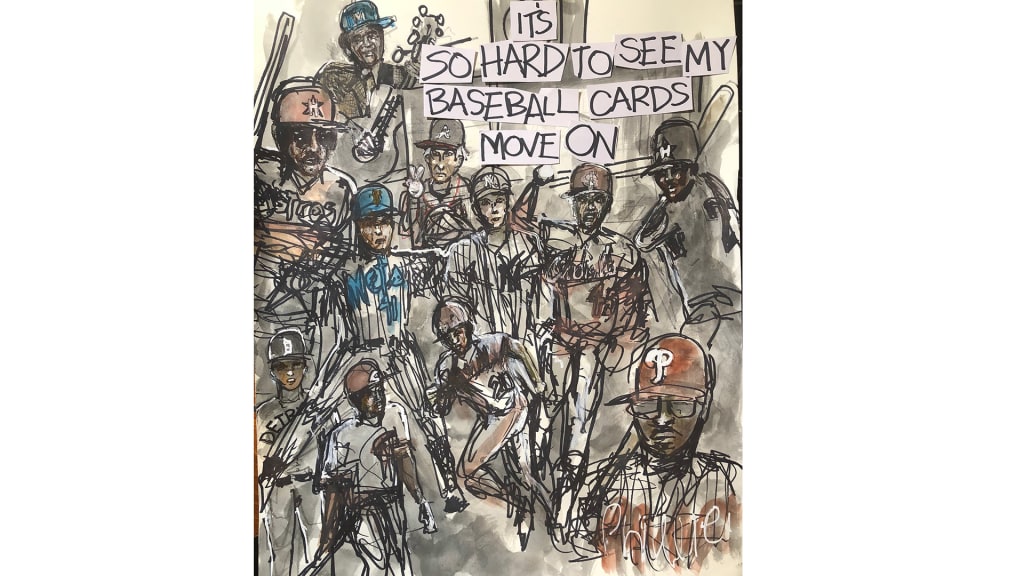Chuck D is one of the most influential and respected musicians of all time. The Public Enemy frontman has released 15 albums with the group, including last year’s "What You Gonna Do When the Grid Goes Down?" with a sound and message that harks back to their classics, "It Takes a Nation of Millions to Hold Us Back" and "Fear of a Black Planet." He’s a member of the Rock & Roll Hall of Fame and arguably one of the most important artists of the past 40 years.
He is also a lifelong dedicated baseball fan, who grew up in Queens rooting for the Mets and despising the Yankees. He was particularly obsessed with baseball cards, and, in recent years, has taken to drawing not just old ballplayers from those cards but old stadiums from his youth, including a glorious drawing of the old Shea Stadium.
He channeled that nostalgic love for baseball, and the big names of his youth, into an illustration and then a song he performed and produced, titled, “It’s So Hard to See My Baseball Cards Move On,” memorializing the ballplayers we lost in 2020. I spoke with Chuck -- who appeared on MLB Network on Monday discussing social justice in baseball -- about the song, his favorite players growing up, the connection between fatherhood and baseball and what Major League Baseball can do to increase its appeal among Black youth.
Your connection to baseball is longstanding and deep. Your drawings, your childhood as a Mets fan, your Pirates hat in honor of Roberto Clemente. What does the game mean to you in your life?
I grew up wanting to be a sportscaster, a baseball player. I ended up being an historian, like many of us, and a baseball nerd for many years before I moved on heavy in the record business. I took on all that as a person, as a musician, the same way I took it on as being a baseball fan. I’ve been an artist, art-wise, graphic-wise, ever since I was, you know, zero. I was born in 1960 in Flushing. And then I’ve been into music as a professional since the 1980s.
And this song?
Those two of these areas converged. When I want to make a statement towards anything I happen to like or have a part of my past, it’s always come in the areas of art and music. This song came about basically because of my contact with Keith Watson, a music producer who is also the son of Bob Watson. We became buddies because he grew up on my music, but I grew up on his dad. [Editor’s note: Bob Watson is a two-time All-Star player who was also general manager of the Yankees when they won the World Series in 1996. He passed away last May at the age of 74.]
I did the illustration of Bob Watson and sent it to Keith, but Bob, it turned out, was on his last days. Bob really liked and enjoyed the illustration I did of him.

Also, a lot of this also comes off of the commonality of myself and also fellow superstar guitarist, one of the great guitarists of the planet, Tom Morello. He would be on our plane, playing Strat-O-Matic. Originally, Tom would just say, "Hey, let’s make a song about this, all the great ballplayers we grew up with that we lost in 2020." I decided to do some artwork, and then out of the artwork came the song. Crazy how it happened.
I’ve always found people in the arts are in awe of athletes, and athletes are just as in awe of those artists. It’s funny how everybody has their idols in their own kind of way.
Athletics and entertainment is all entertainment. It’s not like digging a ditch or hanging an electric wire, you know, hooking up someone’s telephone system. We all do the things that are outside of that, that keeps people’s blood going, keeps them entertained with their tasks and duties of the day. They’re closely intertwined, cheek-by-jaw, hip-by-leg -- together.
Your drawings, you’re obviously talented, but I’ve seen lots of drawings you’ve done. There’s something about the drawings of baseball that feels like there is a clear emotional connection there.
Yeah, I’m drawing my childhood. I’m also flattered by two artists that are in my realm that I admire, two illustrators. One is by the name of Andy Katz, who actually does hip-hop rhymes along with the greats, such as Lou Brock, and illustrations of great musicians and baseball players. The other is Graig Kreindler, probably the greatest baseball painter I’ve ever seen. They were inspirational in me finding a style, to design my pieces. I decided to stay in the illustrator pocket more than a painting pocket.

The sad thing was that I kind of was done, and then we had the passing of two more people. So, as I finished this illustration in October, Phil Niekro passed, and then when it was all said and done in 2020, then at the top of the year, Tommy Lasorda passed. I actually wrote the song after the illustration. It was also coupled with a certain energy that also seemed to draw itself. Also, the words seemed to also rhyme themselves. I had Harold Reynolds’ number in my phone, and I hit him up. I said, “Hey, Harold, I think this is something you’d want to see,” and then Harold just took it to the next level, along with Ryan Gilbert, who actually put the video together.
When these players pass, it’s almost like a chapter of your life moves on too, and they’re greatly reflected by the baseball cards that when I became grown, my dad kept in the garage. My dad transitioned in 2015, and so it’s going on the fifth year now. When I reached out to Keith, he was sort of comforting to me when I lost my dad, talking about how great times we had watching his father and his peers play the game together. This illustration was the best way I could express myself, and the song came out of that.
You’ve talked before about the emotional connection you had with your father around baseball.
For me, no question. It’s a father-and-son connection. It’s a father-son, and also my brother, he would travel around with me doing music, and we knew that we three got together on the game of baseball. That love of baseball, that was our time together. Anything that happens in the game of baseball, especially for those recognizable names, man, it strikes a chord in me.
I was just fortunate to be skilled in the arts and music, where I can actually cover both areas and do something that actually touches people. I mean, I feel that the genre that I’m in, rap music, a lot of times people think that it’s limited, but it’s really vast. It’s a little bit like country and western. When we lost Charley Pride, my dad also loved country music, and Charley Pride is the Black country artist who also played baseball within the Mets' Minor League system. My dad listened to him, and when he passed, that also furthered me in writing not only a song but tying the dots together, a great musician, somebody we looked up to, and just to show the commonality in all of us in our spirit, just to be able to say, all right, this is rap music, that’s country music, Johnny Cash is The Man in Black, but I call myself The Black in Man.
We saw unprecedented activism in all sports in 2020, and in baseball, too. If you would’ve told me 10 years ago that there would be a cancellation of a baseball game because players were protesting the shooting of a Black man, I would’ve found that very surprising, to be entirely honest with you. Do you think this sort of progress has been building for a while?
You’ve got to give credit to a different woke generation that will think a little differently from the predecessors. Also, if you can say anything about the sport of baseball and the people playing baseball, players playing with each other, amongst each other. That’s very important. The fans might not always be on the same page together, but the players usually are.
This feels like a catalyzing moment for activism in sports, where athletes aren’t just getting more publicly engaged in social justice, but staying involved. You are someone who obviously has been involved in these issues your whole life. Do you see that? Have you talked to young athletes who feel more engaged on this than ever?
They are, but this is their time. The trick is that you don’t let it stop there, because once this generation is in their 30s and 35 and moving to older age, somebody has to be there to pass the baton of responsibility down to the next couple of generations that come up, and not take any of this for granted and not forsake any of these things. I feel that is essential to do because they have the microphone and they have the time and accessibility and the focus. It’s about making sure that there is a maintenance of awareness. It is always the same story throughout the years. During Jackie Robinson, even before there was a Negro League even, they were saying Black players, Black lives, didn’t matter. There was this collectivism that fought for this activism, in a righteous way, they’re saying, "Look, treat us equal, just like everybody else." Baseball was a sport that seriously symbolized these movements, and the movements were always gracious and done with some dignity, saying, “Look, give us a shot in this, and we’ll show, not only are we just as good as, many cases better, and want to make everybody finally recognize that this game is something that brings people together for the best of us.”
Chris Rock has a line where he says that being a Black baseball fan is like being an endangered species. Do you still feel that’s the case?
The selling of the game has to somehow be in step with the makeup of the people, I think. What Chris Rock is talking about, a lot of times people in the hood might say that the game does not reach them. But it’s got to be a concentrated effort on both sides. People have to go meet them, too. It’s about really knowing what’s there, and what the opportunities are. You fall in love with the game. You play, you get involved with it, and you learn all the nuances about it, and you learn to love it. But baseball’s gotta put in the effort, too.
Do you think Major League Baseball itself bears some responsibility in this? Is there something in the culture of the sport today? The percentage of Black players now, compared to 20 years ago, is dramatically lower. What do you think they can do better to better reach that community?
Oh, it’s a list that probably goes to 20 to 25 different things. Too long for this article. It’s something that really has to really start from the core. I mean, the '60s are different than the millennials right now. What has happened to the Black family is different, so it needs adaptations to try to get us to a better place, so to speak. To bring Black folks to a game, it starts from a rooted structure when we’re together. When we’re not together, it’s a hard game to sell.
When you watch the game now, is there a player or a team or something that you watch and think, this player is magnetic; this is someone that reminds me of watching baseball as a kid, this is someone baseball should be building their game around?
Andrew McCutchen. Still.
Who’s the best baseball player you’ve ever seen?
I’ve never seen anything like Barry Bonds. I would have thought it was impossible that you would walk somebody with the bases loaded in the ninth inning instead of pitching to him. That’s crazy.
